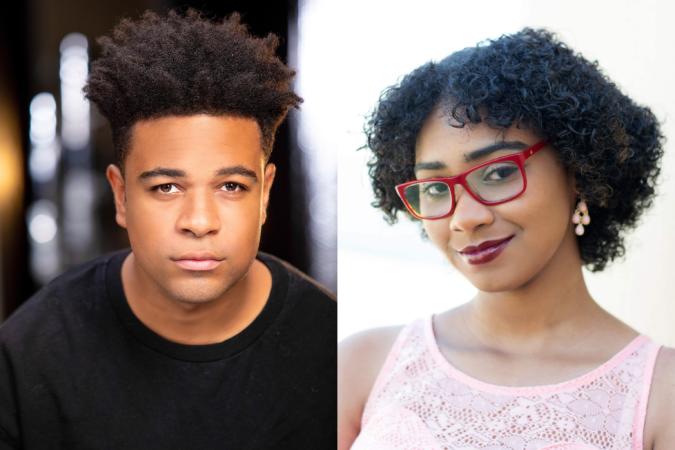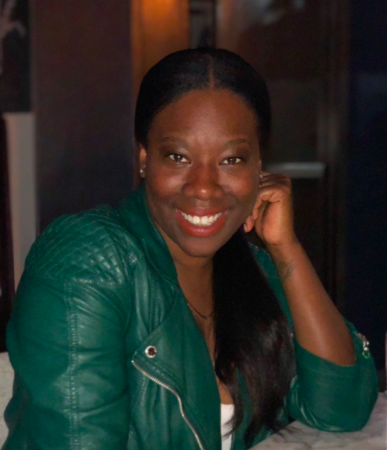Black people have always loved anime, whether their fandom began with “Sailor Moon” and “Pokémon” or they cut their teeth on “Naruto” and “Dragon Ball Z.” But much like other creative mediums, the relationship between the Japanese animation medium and its Black characters has been one in need of more accurate and diverse representation.
Over the years, award-winning Funimation voice actors Anairis Quiñones and Zeno Robinson — best known for their roles as Mirko and Hawks in “My Hero Academia”— have seen more progression in anime away from its problematic beginnings.
“‘Cyborg 009’is a legendary series from the ’80s, and its character Pynuma’s portrayal from the ’80s till now has drastically changed,” said Robinson, who has studied under greats like Phil LaMarr, Ginny McSwain, and Tony Oliver. “His first portrayal had big lips and exaggerated features, but as time progressed, his character design changed to look more like an actual human being. It’s a testament to the times.”
Quiñones has also seen how her roles as Mirko and Nessa (Pokémon) have been game-changers in representation for Black women.
“I was raised in the white community, but it was through the Black community that I was introduced to anime,” she said. “I realized Black fans weren’t seeing themselves in staff, cast, or very much in anime media at all. Everyone was excited to see Nessa and Mirko when they first came out because we deserve to see ourselves in this space.”
Here is Hawks' voice actor @childishgamzeno with some words about their #AnimeAwards 2021 win! pic.twitter.com/iuXjE0GkG1
— The Anime Awards (@TheAnimeAwards) February 20, 2021
Outside of on-screen portrayals, colorblind casting also drums up tons of controversy. Throughout their respective journeys in the anime dubbing world, Quiñones and Robinson have dubbed both Black and non-Black characters. As a result, they’ve seen the pros and cons of the practice.
“Colorblind casting is important, but it can also be hurtful,” Robinson said. “One of the most important things about representation, and as a Black man, I like seeing myself in Black stories.”
AfroTech called up Quiñones and Robinson to discuss the complications of colorblind casting, Black voice actors breaking barriers in anime, and why representation is so important.
Editorial Note: This piece has been edited for clarity and length.
AfroTech: So, how has it been navigating that space for you?
Anairis Quiñones: There was no such thing as Afro-Latina voice actors, so I mostly had to look toward Cree Summer and a Polynesian voice actress. But I remember expressing how I was so afraid of pursuing this professionally because I didn’t see a lot of myself in casts, and I was so afraid of my talent not being enough.
Zeno Robinson: It was hard for me in the beginning. I would only get to audition for Black roles or roles of color. And for me, on top of Black roles, it was roles that weren’t fit for me, like characters who were too old for my vocal print. It started making me feel like these are the roles that are getting presented to me because I’m Black, and it became a very frustrating experience to the point where I didn’t want to do it anymore. Because it’s a mainly Japanese medium, the odds of you seeing a Black character are like one in 25 characters in the whole show, so to only be able to audition for one out of 25 characters while your peers get to audition for all 25 is difficult.
AfroTech: Despite a bumpy journey, you both stuck with it. How has the portrayal of Black characters progressed as well as the casting of Black voice actors?
Anairis Quiñones: There’s been so much positive change. The last time I remember seeing a Black female anime character was Michiko in ‘Michiko & Hatchin,’ and there’s so much Afro-Latina representation because she’s an Afro-Latina character, and that was the last time I saw really good representation. But in recent years you’re seeing, you know, more diversity. I’m watching this anime called ‘Wonder Egg Priority’ where you see a Black anime character wearing natural curls and other details that matter so much. So yeah, I think representation has definitely gotten better in terms of media.
Zeno Robinson: I’ve played Black characters in anime who usually don’t have a lot to do. They’re either the helpful friends or they are your enemy or they say two words. But now, if you look at shows like ‘Carole & Tuesday,’ Shinichirō Watanabe always makes it a point to have diverse stories. Carol is a fully realized Black girl. Canary in ‘Hunter X Hunter’ and Mirko in ‘My Hero Academia’ are Black female characters who women of color all around the world admire and see themselves in. I’ve had the honor and pleasure of playing Ogun Montgomery in ‘Fire Force,’ who is really well-designed. He also has an actual purpose in the show, and his name and all of his attacks are all references to the Yoruba god Ogun, Yoruba spirits, and Nigeria. That’s a significant reminder that as time has progressed, the characters have improved as well.
Anairis Quiñones: The only character recently that I feel has been stereotypical was in ‘The Promised Neverland.’ But Rebeka Thomas voiced her and she steered so far away from sounding like a caricature that you could just focus on her performance. If you had somebody white portraying her, it probably would have ended up too stereotypical. That’s why the voices in those roles are important. But yeah, in terms of Nessa in ‘Pokémon’ and Mirko from ‘My Hero Academia,’ there’s much better representation. You get to see Black people just be themselves, just be humans and heroes in their own stories, and it’s so fantastic to see.
AfroTech: What is your take on colorblind casting?
Anairis Quiñones: Anyone who starts voice acting starts because they view it as a career where you can be anyone and anything, regardless of what you look like. And for me, I never want to be put into a box. I never want to be told, no, you can’t play this character just because you don’t match me. And that’s mostly in regards to playing white characters or in anime where everyone’s ambiguously white or Japanese. I don’t like the idea of being told no, and I don’t think anyone else should either. But I think because we are lacking so much representation within the industry, it’s very important for Black voices to portray Black characters and not just me or Zeno or someone who is more prominent. Voice actors that you haven’t heard before should be introduced into the industry and given the opportunity to show their stuff.
Zeno Robinson: When you watch ‘Get Out,’ you connect with everything Chris is going through in the movie because it’s a shared experience and unique to Black people. Black people should tell Black stories because Black people can tell Black stories authentically. That’s why you saw a lot of people step down from those roles [during summer 2020 amid the reckoning over representation]. But if those roles don’t call for Black experiences or Black culture, I guess it’s okay. But how do you portray someone Black better than a Black person?
AfroTech: Who are some of the barrier breakers in the anime space?
Anairis Quiñones: Zeno Robinson is a big game-changer. Marc Swint, my mentor, has done a lot behind the scenes trying to make sure that he can encourage more colorblind casting and more informed directors. Directors like Caitlin Glass and Colleen Clinkenbeard have been open-minded and willing to have representation, and that’s been fantastic.
Zeno Robinson: I especially want to give a shout-out to Mark Allen Jr. who plays the lead in ‘The Day I Became a God.’ Dani Chambers is the co-lead, so the show is led by two people of color, which I just don’t think has happened. And then there’s Bill Butts who actually sat down with casting directors in L.A. to talk to them about why it’s important to give opportunities to people of color.
AfroTech: What advice do you have for up-and-coming Black voice actors?
Anairis Quiñones: Keep being motivated, keep persevering, and keep working hard on your craft. Take workshops, network as much as you can, and learn as much as you can. And I promise that if you work hard enough, it will pay off. You are more than enough.


